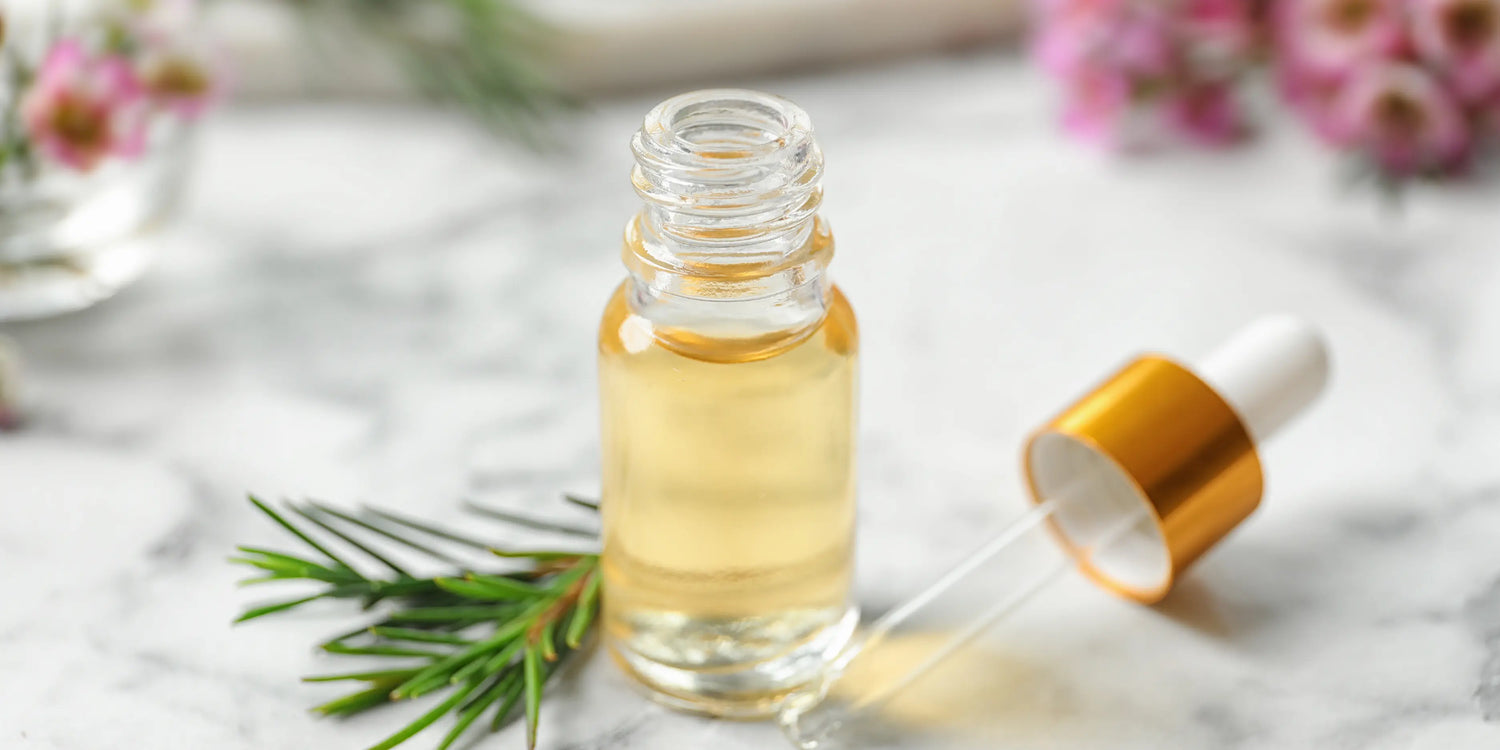Tea tree oil has been used for centuries as a natural treatment for scalp and hair health. It can help with flakes, itchiness, and buildup from hair products.
In this article, we’ll go over what tea tree oil is, how it works to support scalp and hair health, and the safest ways to use it so you get results without side effects.
What is Tea Tree Oil?
Tea tree oil is derived from the leaves of a plant native to Australia called Melaleuca alternifolia. This plant contains natural compounds like terpinen-4-ol, which gives it powerful antibacterial, antifungal, and anti-inflammatory properties. Tea tree oil can also reduce swelling and redness on skin and assist with scalp conditions.
Australians have long sworn by its effectiveness, and more recently it has become a popular organic treatment worldwide for those seeking a natural solution to skin and hair problems.
Why Tea Tree Oil is Good for Your Scalp and Hair
Reduces dandruff and dry scalp
One of the most studied uses for tea tree oil is dandruff control. In a clinical study, people who used shampoo with 5% tea tree oil daily for four weeks had 41% less dandruff compared to just 11% in the placebo group. This large difference highlights how effective tea tree oil can be for dandruff.
Cleans without stripping natural oils
When used properly, tea tree oil helps remove dead skin cells, excess oil, and leftover styling products from the scalp, without over drying. This creates a healthier environment for hair growth.
Soothes skin irritation
Tea tree oil may reduce redness, itchiness, and irritation associated with conditions like seborrheic dermatitis or mild psoriasis.
Supports healthy hair growth
A healthy scalp is the foundation for healthy hair. While tea tree oil is unlikely to directly regrow hair in cases of genetic hair loss, it can support hair regrowth treatments by improving scalp health.
Hair and Scalp Problems Tea Tree Oil May Help With
- Dandruff / Seborrheic Dermatitis – Scientific evidence supports its use in shampoos at around 5% concentration.
- Scalp Acne / Folliculitis – Its antimicrobial action can reduce bacteria that contribute to pimples on the scalp.
- Hair Loss (Indirect) – By removing buildup, tea tree oil creates a healthier environment for hair treatments. Alone, it is not proven to regrow hair from androgenetic alopecia.
How to Use Tea Tree Oil for Hair
-
Choose the Right Form
Shampoo – Look for one with ~5% tea tree oil.
Diluted Oil – Mix 2–3 drops of tea tree oil into 1 tablespoon of a carrier oil (almond, coconut, or jojoba). -
Test First – Start Slow
Begin once per week, especially if you have sensitive skin. Increase to 2–3 times weekly if tolerated. -
Application Tips
Massage diluted oil into the scalp for 5–10 minutes, then wash out.
Add a few drops to your shampoo or conditioner.
For irritation, apply diluted oil directly to the area before washing.
Safety Tips
- Always dilute tea tree oil. Pure oil can irritate or burn skin.
- Do a patch test first: apply to inner arm and wait 24 hours.
- Never ingest tea tree oil: it is toxic if swallowed.
- If pregnant or breastfeeding, consult your doctor before use.
- Check with your doctor if you have allergies that could be aggravated.
Final Thoughts
In XYON’s guide on the best oils for hair growth, we noted that tea tree oil can play an important role in keeping the scalp balanced and healthy. Pairing cleansing oils like tea tree with nourishing oils such as almond or argan ensures you get the cleaning benefits without drying out your hair.
If you’re considering adding tea tree oil to your routine, it can be a great option. For those experiencing hair loss, consult a doctor or specialist before starting to ensure it’s safe and effective for your situation.
References
Satchell, A. C., Saurajen, A., Bell, C., & Barnetson, R. S. C. (2002). Treatment of dandruff with 5% tea tree oil shampoo. Journal of the American Academy of Dermatology, 47(6), 852–855. https://doi.org/10.1067/mjd.2002.122734
XYON Health. (2024). Best Oils for Hair Growth: What Works and Why. Retrieved August 12, 2025, from https://xyonhealth.com/blogs/library/best-oils-for-hair-growth




